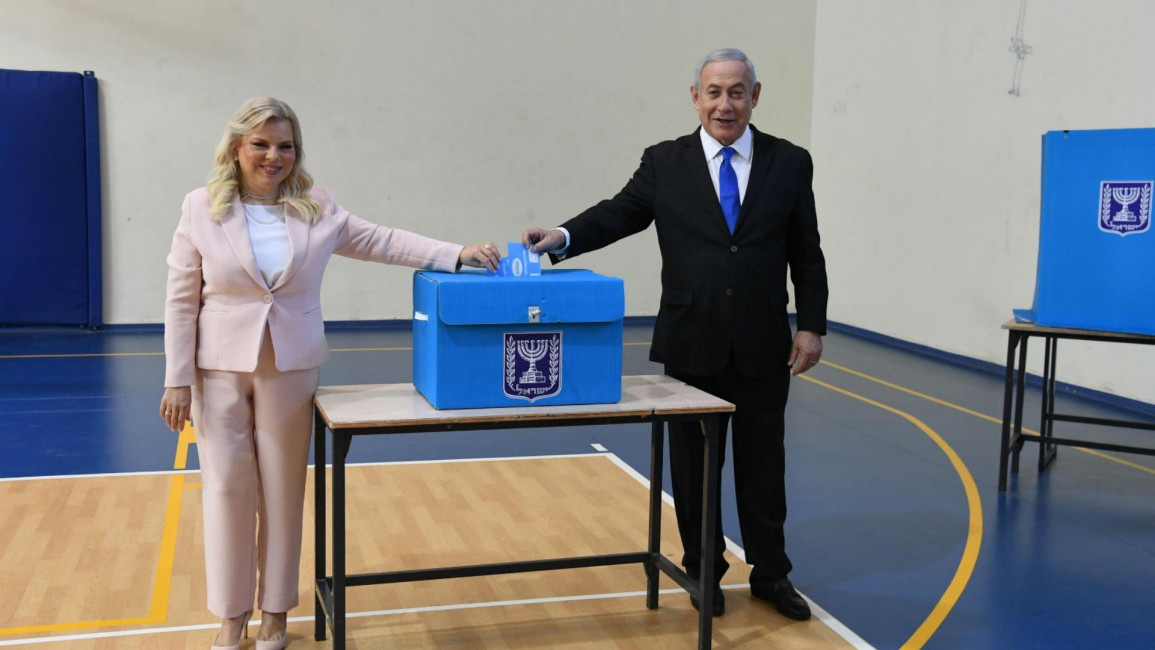Israeli exit polls suggest Netanyahu has failed to secure majority
The results were broadcast by Israel's three major TV stations after polling stations across the country closed.
Polls shown by Channel 13 and Channel 12 placed the centrist Blue and White party, headed by his chief rival Benny Gantz, in the lead over Netanyahu’s Likud party, while Channel 1 placed them neck and neck.
The surveys by Israeli television stations gave Netanyahu’s right-wing Likud 31-33 of parliament’s 120 seats compared with 32-34 for the centrist Blue and White led by former general Benny Gantz.
The set back deals a blow to the PM who is fighting to secure a record fifth term in office, extending his current record as the country’s longest serving prime minister.
None of the polls broadcast on local news suggested Netanyahu's right-wing bloc would be able to secure the 61-seat majority of the Knesset needed to form a government, in a repeat of events from elections in April.
The official elections results are expected on Wednesday.
The results prompted initial cheers at Blue and White's post-election party in Tel Aviv, where they were shown on large screens, before doubts began to set in.
"We have an advantage, but I see that we are dependent on Lieberman," said supporter Dina Margoli, 40.
The stakes could not be much higher for the 69-year-old Netanyahu, Israel's longest-serving prime minister, who is facing possible corruption charges in the weeks ahead.
He spent the day warning he was on the verge of losing if his supporters did not turn out to vote, and made appearances at Jerusalem's main market and its central bus station, wielding a megaphone to exhort the crowds.
He repeatedly warned, as he has in previous elections, that left-wing and Arab voters were showing up in large numbers to vote him out, appearing on Facebook live to do so.
US "President (Donald) Trump said yesterday that the elections will be tight," Netanyahu said when voting on Tuesday morning, referring to comments by his staunch ally who called the polls “50/50".
"I can guarantee you this morning that they are very tight.”
Gantz voted in his hometown of Rosh Haayin near Tel Aviv and called on the country to reject corruption and “extremism".
"We want new hope. We are voting today for change," Gantz said after voting with his wife Revital.
"We will succeed in bringing hope. We will succeed in bringing change, without corruption and without extremism, all together.”
Later he visited a shopping mall in the northern city of Haifa and addressed the public through a megaphone on the beach in Tel Aviv.
Read more: Comment: Palestinian hopes don't lie in Israel's election, but in America 2020
Fears of election fatigue appeared not to have materialised.
Turnout as of 8:00 pm (1700 GMT) was at 63.7 percent, higher than the same time during April's election, official figures showed.
Immunity?
Netanyahu, who has been prime minister for a total of more than 13 years, suffered one of the biggest defeats of his political career following the April vote.
His Likud, along with its right-wing and religious allies, won a majority which led President Reuven Rivlin to task him with forming a government.
But following weeks of discussions, Netanyahu failed, opting for an unprecedented second election rather than risk Rivlin choosing someone else.
Many believe that if he wins, Netanyahu could seek to have parliament grant him immunity from prosecution ahead of a possible corruption indictment in the weeks ahead.
Recognising the stakes, Netanyahu spent the final days of the campaign seeking to appeal to right-wing nationalists -- key to his re-election bid -- and to boost turnout among his base.
Those efforts included a controversial pledge to annex the Jordan Valley, which makes up a third of the occupied West Bank.
He issued unfounded warnings that the vote could be stolen by fraud in Arab communities, leading critics to accuse him of racism.
But Netanyahu has also highlighted the country's growing economy and his relationships with world leaders such as Trump.
Follow us on Twitter: @The_NewArab



